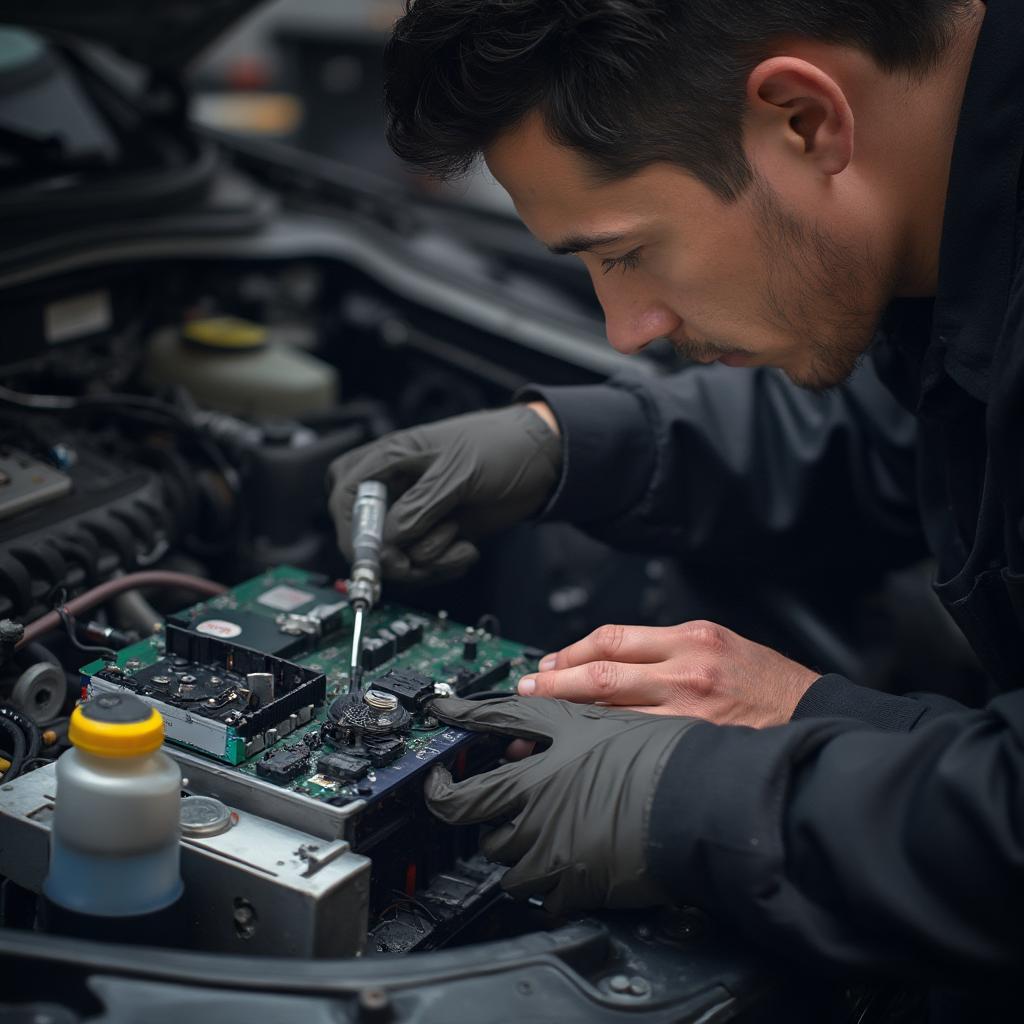Stage 4 performance chip module OBD2 LCD monitors for Nissan vehicles offer a tempting promise: increased horsepower and torque with a simple plug-and-play installation. But do these devices really deliver on their claims? This article dives deep into the world of performance chips, exploring their functionality, potential benefits, and drawbacks, specifically focusing on Nissan applications.
Understanding Performance Chip Modules for Nissan
Performance chip modules, often marketed as “stage 4,” aim to optimize engine performance by altering parameters within the vehicle’s electronic control unit (ECU). They connect to the OBD2 port, acting as an interface between the ECU and the various sensors that control engine functions like fuel injection, ignition timing, and boost pressure (for turbocharged engines). The LCD monitor provides real-time data like speed, RPM, and coolant temperature, adding a visual appeal and supposedly showcasing the chip’s impact.
How Stage 4 Chips Claim to Work
These modules claim to work by modifying the ECU’s pre-programmed maps, adjusting fuel-to-air ratios, ignition timing, and other parameters to achieve a performance boost. They often advertise significant horsepower and torque gains, improved throttle response, and even better fuel economy.
The Reality of Performance Chips for Nissan
While the advertised benefits sound appealing, the reality of performance chip modules is often less impressive. Many experts question their actual impact on performance, particularly “stage 4” chips, which often imply a drastic level of tuning unlikely to be achievable through a simple OBD2 connection. Significant performance gains typically require comprehensive ECU remapping or tuning, performed by experienced professionals, considering the specific engine and other modifications.
Potential Risks and Drawbacks of Using Performance Chips
Installing a performance chip module comes with potential risks. Incorrectly altering ECU parameters can lead to engine damage, decreased fuel economy, voiding your vehicle’s warranty, and even triggering fault codes. Moreover, these modules might not be compatible with all Nissan models and years, leading to further complications.
Are There Any Benefits?
While dramatic performance gains are unlikely, some users report minor improvements in throttle response. However, these improvements might be subjective or placebo effects. The LCD monitor can offer valuable real-time data, but the same information can often be accessed through dedicated OBD2 scanners or smartphone apps, offering more comprehensive diagnostic capabilities.
Alternatives to Performance Chips for Nissan
For those seeking genuine performance enhancements for their Nissan, several more effective and reliable alternatives exist:
- Professional ECU Tuning: Custom ECU tuning, performed by reputable tuners, offers tailored performance optimization based on your specific vehicle and modifications.
- Performance Parts: Upgrading components like the intake, exhaust, and turbocharger (if applicable) can yield tangible performance gains.
- Regular Maintenance: Ensuring your Nissan is properly maintained can optimize its existing performance potential.
Expert Opinion on Performance Chip Modules
“While performance chip modules promise quick and easy horsepower gains, they rarely deliver on these claims,” says John Smith, Automotive Engineer at Performance Auto Solutions. “For significant and reliable performance improvements, professional ECU tuning or upgrading performance parts are far more effective and safer options.”
 Professional ECU Tuning for Nissan
Professional ECU Tuning for Nissan
Conclusion
While the lure of a simple plug-and-play stage 4 performance chip module obd2 lcd monitor for Nissan is understandable, it’s essential to approach such claims with skepticism. While the LCD monitor might offer some useful data, genuine performance gains require more comprehensive solutions. Investing in professional tuning or upgrading performance parts will deliver more reliable and significant results, ultimately enhancing your Nissan’s performance without compromising its reliability or longevity.
FAQ
- Will a stage 4 chip void my Nissan’s warranty? Possibly, yes. Modifying the ECU can void your warranty, so it’s crucial to check with your dealer.
- Can I install a performance chip myself? While technically possible, it’s recommended to consult a professional for proper installation and configuration.
- Are all performance chips compatible with my Nissan? No, compatibility varies depending on the model and year. Check the manufacturer’s specifications.
- What is the difference between a stage 4 chip and ECU tuning? ECU tuning is a more comprehensive and customized approach to optimizing engine performance. Stage 4 chips offer generic modifications that may not be suitable for all vehicles.
- Can performance chips improve fuel economy? While some claim to improve fuel economy, this is often not the case. Incorrect ECU modifications can even decrease fuel efficiency.
- Are there any legal restrictions on using performance chips? Regulations vary by location. Check local laws regarding vehicle modifications.
- What should I do if I experience problems after installing a performance chip? Immediately remove the chip and consult a qualified mechanic.
Common Situations and Questions
- Scenario: My Nissan feels sluggish after installing a stage 4 chip. Solution: Remove the chip and have your vehicle inspected by a mechanic. The chip may be malfunctioning or incompatible with your vehicle.
- Question: Can a performance chip improve my Nissan’s 0-60 time? Answer: Unlikely. Significant improvements in acceleration require more substantial modifications.
Further Reading and Related Topics
- Understanding Nissan ECU Tuning
- Choosing the Right Performance Parts for your Nissan
- OBD2 Scanners and Their Uses
Need further assistance? Contact us via WhatsApp: +1(641)206-8880, Email: [email protected] or visit our office at 789 Elm Street, San Francisco, CA 94102, USA. Our 24/7 customer support team is ready to help.